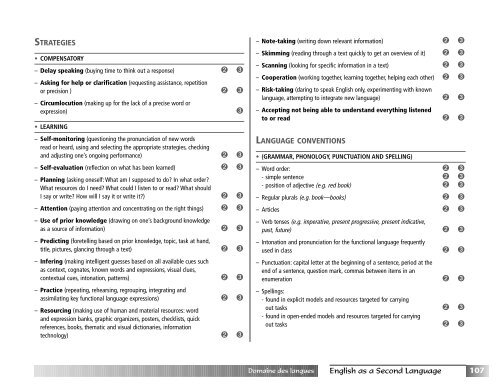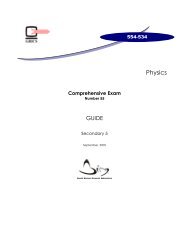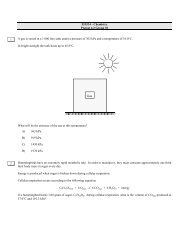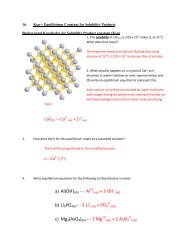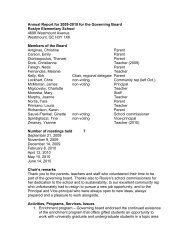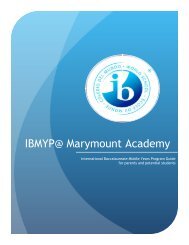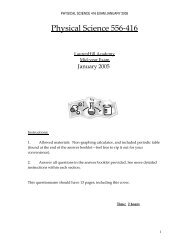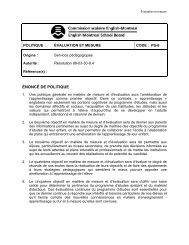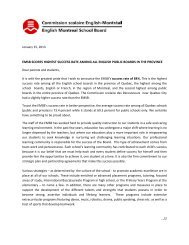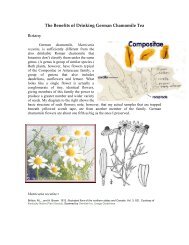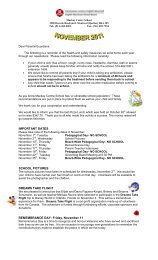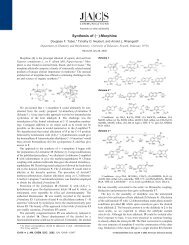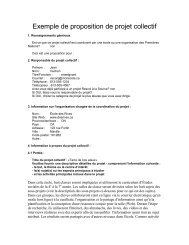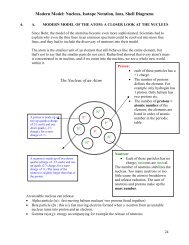Programme de formation de l'école québécoise - Version approuvée
Programme de formation de l'école québécoise - Version approuvée
Programme de formation de l'école québécoise - Version approuvée
Create successful ePaper yourself
Turn your PDF publications into a flip-book with our unique Google optimized e-Paper software.
STRATEGIES<br />
• COMPENSATORY<br />
– Delay speaking (buying time to think out a response) ➋ ➌<br />
– Asking for help or clarification (requesting assistance, repetition<br />
or precision ) ➋ ➌<br />
– Circumlocution (making up for the lack of a precise word or<br />
expression)<br />
• LEARNING<br />
– Self-monitoring (questioning the pronunciation of new words<br />
read or heard, using and selecting the appropriate strategies, checking<br />
and adjusting one’s ongoing performance) ➋ ➌<br />
– Self-evaluation (reflection on what has been learned) ➋ ➌<br />
– Planning (asking oneself: What am I supposed to do? In what or<strong>de</strong>r?<br />
What resources do I need? What could I listen to or read? What should<br />
I say or write? How will I say it or write it?) ➋ ➌<br />
– Attention (paying attention and concentrating on the right things) ➋ ➌<br />
– Use of prior knowledge (drawing on one’s background knowledge<br />
as a source of in<strong>formation</strong>) ➋ ➌<br />
– Predicting (foretelling based on prior knowledge, topic, task at hand,<br />
title, pictures, glancing through a text) ➋ ➌<br />
– Infering (making intelligent guesses based on all available cues such<br />
as context, cognates, known words and expressions, visual clues,<br />
contextual cues, intonation, patterns) ➋ ➌<br />
– Practice (repeating, rehearsing, regrouping, integrating and<br />
assimilating key functional language expressions) ➋ ➌<br />
– Resourcing (making use of human and material resources: word<br />
and expression banks, graphic organizers, posters, checklists, quick<br />
references, books, thematic and visual dictionaries, in<strong>formation</strong><br />
technology) ➋ ➌<br />
➌<br />
– Note-taking (writing down relevant in<strong>formation</strong>) ➋ ➌<br />
– Skimming (reading through a text quickly to get an overview of it) ➋ ➌<br />
– Scanning (looking for specific in<strong>formation</strong> in a text) ➋ ➌<br />
– Cooperation (working together, learning together, helping each other) ➋ ➌<br />
– Risk-taking (daring to speak English only, experimenting with known<br />
language, attempting to integrate new language) ➋ ➌<br />
– Accepting not being able to un<strong>de</strong>rstand everything listened<br />
to or read ➋ ➌<br />
LANGUAGE CONVENTIONS<br />
• (GRAMMAR, PHONOLOGY, PUNCTUATION AND SPELLING)<br />
–Word or<strong>de</strong>r: ➋ ➌<br />
- simple sentence ➋ ➌<br />
- position of adjective (e.g. red book) ➋ ➌<br />
– Regular plurals (e.g. book—books) ➋ ➌<br />
– Articles ➋ ➌<br />
–Verb tenses (e.g. imperative, present progressive, present indicative,<br />
past, future) ➋ ➌<br />
– Intonation and pronunciation for the functional language frequently<br />
used in class ➋ ➌<br />
– Punctuation: capital letter at the beginning of a sentence, period at the<br />
end of a sentence, question mark, commas between items in an<br />
enumeration ➋ ➌<br />
– Spellings:<br />
- found in explicit mo<strong>de</strong>ls and resources targeted for carrying<br />
out tasks ➋ ➌<br />
- found in open-en<strong>de</strong>d mo<strong>de</strong>ls and resources targeted for carrying<br />
out tasks ➋ ➌<br />
Domaine <strong>de</strong>s langues<br />
English as a Second Language 107


